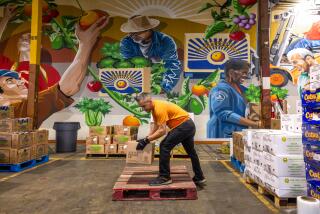Pioneering Florida Program ‘Rescues’ Vegetables to Feed the Poor
- Share via
FLORIDA CITY, Fla. — Anastacia Texidor spent her first seven years in Florida sorting winter produce at a packinghouse where the plum tomatoes that weren’t big enough to ship north were tossed out.
Now Texidor, 62, is one of thousands of poor people who get free vegetables from an innovative market called Farm Share, which rescues imperfect but perfectly edible vegetables from farmers who otherwise would throw them away.
“It’s a blessing from God,” she said as she stooped over a wooden crate brimming with shiny eggplants and added three to her shopping bag of fresh holiday fare.
Farm Share was begun in 1992 to recover the millions of pounds of fresh vegetables that cannot be sold to grocers because they are too big, too small or blemished.
Normally, farmers plow the vegetables under as mulch. Now, 28 farmers in Dade County give the produce to Farm Share, a state-funded organization that has collected and packaged 19 million pounds of produce in the last three years and distributed it to the needy.
Most of the packing labor is done by inmates on work-release programs. The building, most equipment, packing materials--and of course the vegetables--are donated.
“There is no scarcity of food in the United States,” said Patricia Robbins, Farm Share’s executive director. “We could feed every homeless person in the U.S. with the food products that are thrown out in the normal production of getting food to the housewife.”
During the harvest season, Farm Share distributes up to 800,000 pounds of fresh produce a week to social agencies, soup kitchens, food banks and shelters throughout Florida and the entire Eastern seaboard.
Every other week, Miami’s poor are invited to Farm Share’s packinghouse at Florida City Farmer’s Market to pick through the waste-high bins of produce themselves.
There is no limit to how much they can take, though they are turned away if it appears they might be selling it, Robbins said. They must produce identification showing that they are on some type of public assistance.
“There are so many people they can help,” said Texidor, who began working just a few packinghouses down from Farm Share when she arrived in Florida from Puerto Rico in 1978.
Ponda Burnett, 60, a forklift operator on disability, comes to Farm Share every two weeks. As he made his way to his car recently, he thought about what he would do with the hundreds of gnarled red potatoes and eggplants he had just selected.
“Fry ‘em, bake ‘em, stew ‘em, boil ‘em,” he said. “Potatoes? You can do ‘em any way.”
Farm Share receives $250,000 a year from the state Agriculture Department.
The main season runs from Nov. 1 to June 1, when Florida’s farmers harvest the bulk of the country’s winter vegetable crop. In the first six weeks of this season, 7.5 million pounds were rescued, about as much as during the entire 1994-95 season.
In the summer months, Farm Share delivers about 1 million pounds of avocados and tropical fruit, Robbins said.
As staggering as the numbers sound, what is given to the needy is only a fraction--10% to 15%--of what still goes to waste.
“We haven’t even scratched the surface,” said Dave Friedrichs, Farm Share’s president. “Nineteen million pounds in three years, that’s a big, damn number, but it’s nothing compared to what we can do.”
Danny Helms gives about half a million pounds of green beans, yellow squash, tomatoes and hot peppers a year to Farm Share.
“Where else is government doing something so efficient?” he asked. “How many times have food stamps been exchanged for drugs? Here, that can’t happen.”
More to Read
Sign up for The Wild
We’ll help you find the best places to hike, bike and run, as well as the perfect silent spots for meditation and yoga.
You may occasionally receive promotional content from the Los Angeles Times.






